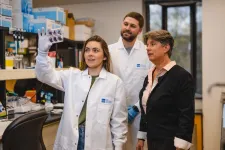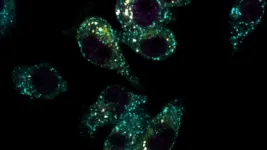(Press-News.org) Experts from Anglia Ruskin University (ARU) have published new guidance to help doctors correctly diagnose hoarding disorder.
Hoarding disorder affects around 2% of the population but remains a largely misunderstood mental health condition. It was only added to the International Classification of Diseases in 2019, having previously been classified under Obsessive Compulsive Disorder (OCD).
Published in the British Journal of General Practice, the new guidance was written by Dr Sharon Morein and Dr Sanjiv Ahluwalia of Anglia Ruskin University (ARU) in Cambridge, England, to help health professionals spot the signs of hoarding disorder and intervene.
ARU experts have also organised a free conference on Wednesday, 10 May to provide the public with more information about the condition.
Hoarding disorder involves clutter in the home environment taking over living spaces, as well as excessive acquisition and difficulty discarding possessions, and affects an individual’s quality of life.
However, it typically comes to the fore only when patients seek support for other mental health or physical conditions and can then act as a barrier to treatment due to concerns about hygiene, safety, or access to the home.
People with hoarding disorder most commonly suffer from depression, while other comorbidities include Obsessive Compulsive Disorder (OCD), and Attention Deficit Hyperactivity Disorder (ADHD).
Dr Morein, an Associate Professor in Psychology at Anglia Ruskin University (ARU) and leader of the ARU Possessions and Hoarding Collective said: “Labels can be very useful in the healthcare system and can be the first stage for people receiving the support they need.
“It is really important that doctors and other frontline healthcare professionals are aware that hoarding disorder is a diagnosable medical condition and that it is usually linked to other issues so that proper support can be offered.
“Typically, hoarding disorder is something that sneaks up on people – it doesn’t happen overnight – and people don’t necessarily recognise they have a problem. One of the major difficulties with hoarding disorder is that sufferers often don’t seek help themselves, and it only presents itself to medical professionals alongside other issues. The sooner the problem is spotted, the sooner support can be provided.”
To help people understand more about hoarding disorder, the ARU Possessions and Hoarding Collective is hosting a free conference at ARU’s Cambridge campus on Wednesday, 10 May.
The event, which will feature expert speakers including Professor Nick Neave of Northumbria University, will explain more about the disorder and the latest support strategies, and is aimed at service providers who help people with hoarding as part of their role, those affected by the hoarding behaviour of others, as well as individuals who themselves are struggling with hoarding.
Dr Morein added: “The ARU Possessions and Hoarding Collective is a group of academics and professionals aiming to improve our understanding of how people interact with their possessions.
“As part of our work, we research how hoarding can affect individuals and their families, as well as how service provision is currently delivered, and how it can be improved. We are inviting all these groups to attend the event in Cambridge on 10 May as we aim to increase awareness and ultimately provide better support for all.”
The open access guidance, published in the British Journal of General Practice, is available at https://bjgp.org/content/73/729/182
For further information about the free conference on 10 May, please visit https://www.aru.ac.uk/community-engagement/aru-hoarding-conference
END
New guidance to help diagnose hoarding disorder
Experts lay out evidence and best practice in British Journal of General Practice
2023-05-04
ELSE PRESS RELEASES FROM THIS DATE:
GlyNAC supplementation improves cognitive decline and brain health in aging
2023-05-04
As people get older, they aspire to live healthy lives as free as possible from the natural decline of cognitive abilities that occurs with aging. At Baylor College of Medicine, researchers have been studying the biological underpinnings of age-associated cognitive decline and developing nutritional strategies to promote healthy brain aging.
They report today in the journal Antioxidants that supplementing GlyNAC – a combination of glycine and N-acetylcysteine as precursors of the natural antioxidant glutathione – improved or reversed age-associated cognitive decline in old mice and improved ...
Three NYU faculty elected to the National Academy of Sciences
2023-05-04
Three New York University faculty have been elected to the National Academy of Sciences: Moses Chao, a professor at NYU Grossman School of Medicine; Glennys Farrar, a professor in NYU’s Department of Physics; and Subhash Khot, a professor in NYU’s Courant Institute of Mathematical Sciences. This year’s election of 120 new members and 23 international members were chosen “in recognition of their distinguished and continuing achievements in original research,” the academy announced.
Moses Chau, a professor of cell biology, psychiatry, and neuroscience and physiology and part of ...
Criteria for selecting who can enroll in multiple myeloma clinical trials may exclude patients from racial and ethnic minorities
2023-05-04
(WASHINGTON, May 4, 2023) – Numerous studies have shown that people from racial and ethnic minority groups are underrepresented in clinical trials of new medical treatments for multiple myeloma. A study published today in Blood suggests that, for clinical trials of new treatments for multiple myeloma (a type of blood cancer), one reason for this underrepresentation may be that the parameters set to determine who can – and cannot – enroll in trials disproportionately exclude minority patients.
“Our ...
Wistar scientists discover innate tumor suppression mechanism
2023-05-04
PHILADELPHIA — (MAY 4, 2023) — The p53 gene is one of the most important in the human genome: the only role of the p53 protein that this gene encodes is to sense when a tumor is forming and to kill it. While the gene was discovered more than four decades ago, researchers have so far been unsuccessful at determining exactly how it works. Now, in a recent study published in Cancer Discovery, a journal of the American Association for Cancer Research, researchers at The Wistar Institute have uncovered a key mechanism ...
Wind energy from a 3D printer
2023-05-04
A pilot project for energy self-sufficient schools is now starting in the County of Friesland, Northern Germany, in which school buildings will be equipped with vertical-axis wind turbines. This will be facilitated by a research group led by Professor Uygun from Constructor University. This group is studying and developing vertical wind turbines, which will be produced in its own 3D printer on the campus in Bremen and will be tested in practice within this project. This creates a fully functional test field that provides important data and experience for technology transfer.
In the current energy ...
Escorting a key immune protein to its demise to control inflammation
2023-05-04
Monash University researchers have discovered a key mechanism in the body’s immune system that helps control the inflammatory response to infection. The discovery could help pave the way for more targeted therapies in a range of inflammatory conditions, such as autoimmunity and neuroinflammatory disease.
The innate immune system is the body’s first line of defence against pathogens. Innate immune proteins detect foreign bodies such as bacteria and viruses and respond by mounting a protective inflammatory ...
Nutrition research continues to support the health benefits of regular watermelon consumption
2023-05-04
There’s no question that watermelon is both delicious and nutritious, but new research underscores this nutrient-rich fruit’s contributions to overall diet quality and heart health.
A recent study published in Nutrients suggests that watermelon can increase nutrient intake and overall diet quality in both children and adults.1 The study analyzed National Health and Nutrition Examination Survey (NHANES) data and found that total diet quality was higher in watermelon consumers as compared to non-consumers. ...
National Comprehensive Cancer Network honors cancer leaders who guide the future of care
2023-05-04
PLYMOUTH MEETING, PA [May 4, 2023] —The National Comprehensive Cancer Network® (NCCN®) has announced the 2023 recipients of awards honoring individuals who made a remarkable difference in improving the lives of people with cancer over the past year.
2023 NCCN Award Recipients:
Theresa J. Franco, MSN, RN, Vice President, Cancer Clinical Operations, Nebraska Medicine
NCCN Board of Producers Award recipient for exemplary service of NCCN’s mission
F. Marc Stewart, MD, Professor, Vice Chair, Department of Hematology and ...
Local entrepreneurs tackling social change, health inequity invited to apply for financial grants
2023-05-04
DALLAS, May 4, 2023 — A recent study revealed that, in the United States, Black and Latinx entrepreneurs receive only 2.6% of venture capital investment. [1] The American Heart Association®, the world’s leading nonprofit organization focused on longer, healthier lives for all, has opened the application window for submissions to the EmPOWERED to Serve Business Accelerator™. The Accelerator program has been established to support local communities, small businesses, social entrepreneurs and innovators who are working to increase health equity and create groundbreaking social change at the zip code level.
Now in its seventh year, the Business ...
Marine seagrass meadows show resilience to ‘bounce back’ after die-offs
2023-05-04
In Florida alone, thousands of acres of marine seagrass beds have died. Major seagrass die-offs also are occurring around the world. Stressors such as high temperature, hypersalinity and hypoxia or lack of oxygen affect seagrasses’ ability to resist and recover from these stressor-related mortality events or when disturbances lead to seagrass die-off events.
Seagrass die-offs also are linked to exposure to sediment-derived hydrogen sulfide, a well-known phytotoxin that accumulates as seagrass ecosystems become more enriched in nutrients. While hydrogen sulfide intrusion into seagrass tissue is considered a leading cause of recurring mortality ...
LAST 30 PRESS RELEASES:
A promising potential therapeutic strategy for Rett syndrome
How time changes impact public sentiment in the U.S.
Analysis of charred food in pot reveals that prehistoric Europeans had surprisingly complex cuisines
As a whole, LGB+ workers in the NHS do not experience pay gaps compared to their heterosexual colleagues
How cocaine rewires the brain to drive relapse
Mosquito monitoring through sound - implications for AI species recognition
UCLA researchers engineer CAR-T cells to target hard-to-treat solid tumors
New study reveals asynchronous land–ocean responses to ancient ocean anoxia
Ctenophore research points to earlier origins of brain-like structures
Tibet ASγ experiment sheds new light on cosmic rays acceleration and propagation in Milky Way
AI-based liquid biopsy may detect liver fibrosis, cirrhosis and chronic disease signals
Hope for Rett syndrome: New research may unlock treatment pathway for rare disorder with no cure
How some skills become second nature
SFU study sheds light on clotting risks for female astronauts
UC Irvine chemists shed light on how age-related cataracts may begin
Machine learning reveals Raman signatures of liquid-like ion conduction in solid electrolytes
Children’s Hospital of Philadelphia researchers emphasize benefits and risks of generative AI at different stages of childhood development
Why conversation is more like a dance than an exchange of words
With Evo 2, AI can model and design the genetic code for all domains of life
Discovery of why only some early tumors survive could help catch and treat cancer at very earliest stages
Study reveals how gut bacteria and diet can reprogram fat to burn more energy
Mayo Clinic researchers link Parkinson's-related protein to faster Alzheimer's progression in women
Trends in metabolic and bariatric surgery use during the GLP-1 receptor agonist era
Loneliness, anxiety symptoms, depressive symptoms, and suicidal ideation in the all of us dataset
A decision-support system to personalize antidepressant treatment in major depressive disorder
Thunderstorms don’t just appear out of thin air - scientists' key finding to improve forecasting
Automated CT scan analysis could fast-track clinical assessments
New UNC Charlotte study reveals how just three molecules can launch gene-silencing condensates, organizing the epigenome and controlling stem cell differentiation
Oldest known bony fish fossils uncover early vertebrate evolution
High‑performance all‑solid‑state magnesium-air rechargeable battery enabled by metal-free nanoporous graphene
[Press-News.org] New guidance to help diagnose hoarding disorderExperts lay out evidence and best practice in British Journal of General Practice




